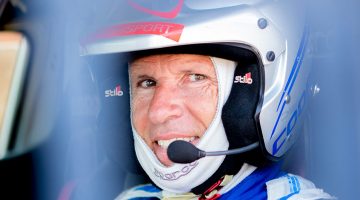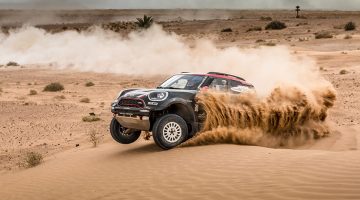Following a drive in the X-Raid MINI ALL4 Racing Dakar rally car, crankandpiston.com sits down with two-time event winner Nani Roma to discuss that special feeling the Dakar produces, THAT team orders controversy, why Peugeot’s return to the sport is a good thing, and why riding with broken fingers is not that big a deal.
Try to imagine braving thousands of kilometres across rugged terrain, temperatures exceeding 60 degrees at their height, dunes taller than most double decker buses, and rocky enclaves and valleys that prove a haven for punctures, suspension failure and rattled spleens. The 42-year old Spaniard sitting in front of me has been putting his body through such punishment on the infamous Dakar Rally since 1996, and that’s not even including the pummelling received during 10-round FIA World Cup for Cross Country Rallies campaigns. Consequently, my opening question to reigning Dakar Rally winner Joan ‘Nani’ Roma, is an easy one: why on earth does he do it?
“It’s a challenge,” he smiles. “Sure, it’s my job, but it’s also my passion. You need that to fight everyday, especially on the Dakar. It’s difficult to explain really, but driving across a completely empty desert, going flat out…it’s just an amazing feeling.”
It’s a feeling he’s experienced many times before, though arguably none were greater than Dakar 2014. Across 13 days and more than 8000km, Nani fended off X-Raid teammates (and former winners) Stephane Peterhansel and Qatar’s Nasser Al-Attiyah as well as rivals from Toyota and Hummer to secure his second victory on the event. In doing so, Nani became only the third man in history – after that man Peterhansel and trendsetter Hubert Auriol – to win the Dakar on both four wheels and two. He even managed to do so ten years to the day as his first victory with KTM in 2004.

“When it’s the same day – January 18 2004 on the bike and January 18 2014 in the car – that does make it more special,” Nani explains. “It really was one of the best moments of my professional life. You dream that one day you will get the chance to compete in the Dakar, but you never dare dream that you might win. When you race for the first time, you think ‘maybe it is possible to win’. And when you win on a bike, it’s another crazy dream achieved! I never expected to win with cars too. Clearly anything is possible.”
The victory bubbly however was tainted in 2014 by the much-publicised team orders ‘row’ that rocked X-Raid. With barely two minutes separating leader Nani from second-placed Peterhansel and third-placed Al-Attiyah snapping at their heels, the call came from X-Raid team boss Sven Quandt to maintain position and preserve a MINI podium lockout rather than risk a potentially embarrassing eleventh hour retirement. For Nani, having led throughout and taken two stage victories, the call was ideal. For his French teammate, having battled back from forty minutes in arrears after problems early on, it was a bitter blow.

“Y’know, this is motorsport, and as such team orders do exist,” a contemplative Nani begins. “They can decide the result of the rally and sometimes this can happen three or four days before the finish. Take Mitsubishi in 2007, when [Luc] Alphand and Stephane [Peterhansel] were fighting for the win” – during which team orders issued with several stages still to go went in Peterhansel’s favour -“And at the time, nobody said anything. This year, I think the team were very fair. On the last day, overall I was 20 seconds ahead of Stephane and Nasser, and the call came, ‘no more risks guys, stop.’
“It’s at that moment you realise the cost of fighting, and how important a full podium is to MINI. If you lose two cars on the final day – and you can – you would look stupid. And the reaction of the press was unbelievable, and I was a little pissed off with that. I’d made a really good race, I’d won two stages, Michel [Périn, four-time Dakar winning co-driver] had done an amazing job, and we’d stayed at the front for eight days. We’d worked hard for that win.”
STORY CONCLUDES ON PAGE 2



